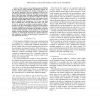Free Online Productivity Tools
i2Speak
i2Symbol
i2OCR
iTex2Img
iWeb2Print
iWeb2Shot
i2Type
iPdf2Split
iPdf2Merge
i2Bopomofo
i2Arabic
i2Style
i2Image
i2PDF
iLatex2Rtf
Sci2ools
114
click to vote
CEC
2008
IEEE
2008
IEEE
Automatic model type selection with heterogeneous evolution: An application to RF circuit block modeling
— Many complex, real world phenomena are difficult to study directly using controlled experiments. Instead, the use of computer simulations has become commonplace as a cost effective alternative. However, regardless of Moore’s law, performing high fidelity simulations still requires a great investment of time and money. Surrogate modeling (metamodeling) has become indispensable as an alternative solution for relieving this burden. Many surrogate model types exist (Support Vector Machines, Kriging, RBF models, Neural Networks, ...) but no type is optimal in all circumstances. Nor is there any hard theory available that can help make this choice. The same is true for setting the surrogate model parameters (Bias Variance trade-off). Traditionally, the solution to both problems has been a pragmatic one, guided by intuition, prior experience or simply available software packages. In this paper we present a more founded approach to these problems. We describe an adaptive surrogate mode...
| Added | 29 May 2010 |
| Updated | 29 May 2010 |
| Type | Conference |
| Year | 2008 |
| Where | CEC |
| Authors | Dirk Gorissen, Luciano De Tommasi, Jeroen Croon, Tom Dhaene |
Comments (0)

